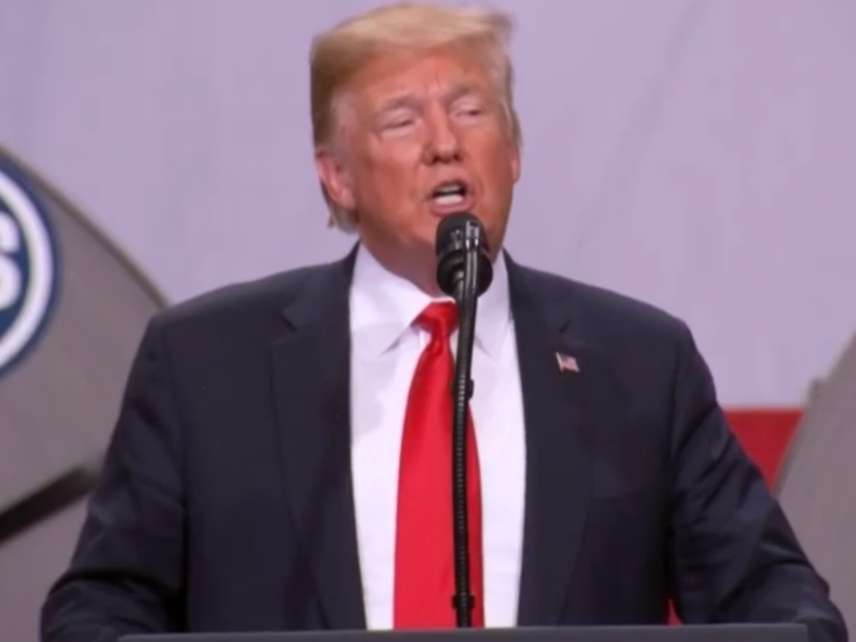'If We Didn't Trade,' Trump Argues, 'We'd Save a Hell of a Lot of Money'
The president's longstanding obsession with trade deficits reveals mercantilist instincts he cannot escape, no matter how much he talks about zero tariffs.

"Our trade deficit ballooned to $817 billion," Donald Trump said during a speech to steelworkers in Granite City, Illinois, yesterday. "Think of that. We lost $817 billion a year over the last number of years in trade. In other words, if we didn't trade, we'd save a hell of a lot of money."
According to the U.S. Census Bureau, the president exaggerated the size of the 2017 trade deficit by 48 percent. But that's a mere quibble compared to his fundamental misunderstanding of what that number means, which in turn reflects a zero-sum view of economic exchange that does not bode well for the outcome of a tariff war supposedly aimed at promoting free trade.
"If we didn't trade," Trump argues, "we'd save a hell of a lot of money." But that does not mean we'd be better off, since we would not have all the things we buy with our money, which we clearly value more than the money itself, since no one forces us to exchange one for the other. The analysis is the same whether or not the people who sell us things happen to be located in the United States.
"Without trade, we could have piles of money," Cato Institute trade specialist Scott Lincicome concedes in an interview with The New York Times. "But we'd have no food, clothing, housing, etc. So the money would be worthless, unless you swam in it like Scrooge McDuck or something."
The president, despite his Wharton degree and business career, frequently seems baffled by this concept, prompting corrective analogies from people with a firmer grasp of economics. "When you're almost 800 Billion Dollars a year down on Trade, you can't lose a Trade War!" Trump asserted on Twitter last month. "I'm way down on trade with restaurants, grocery stores, malls, and movie theaters," Rep. Justin Amash (R-Mich.) replied. "I keep buying from them, but they never buy from me. I must be getting ripped off, right?"
As with many things the president says, his comments about trade raise the question of whether he really is as clueless as he seems or is playing dumb as part of some Machiavellian strategy. The answer matters because Trump intermittently says he understands the value of trade and ultimately aims to promote it with his can't-lose war, which he claims will encourage reciprocal reductions in tariffs and other barriers. This week he bragged that his tariffs on European imports had led to negotiations aimed at virtually eliminating trade barriers between the U.S. and the E.U. "I love trade," he declared on Fox News last month. "Trade has always been my thing."
During the presidential campaign Trump also would alternate between portraying trade deficits as inherently bad and praising the principles that make them inevitable. "I love trade," he insisted during a 2015 Republican debate. "I'm a free trader, 100 percent. But we need smart people making the deals, and we don't have smart people making the deals."
Trump has been saying the same thing for at least two decades. "You only have to look at our trade deficit to see that we are being taken to the cleaners by our trading partners," he wrote in The America We Deserve, published in 2000. "Our long-term interests require that we cut better deals with our world trading partners."
Maybe Trump has been putting on a show all this time, so that when he was finally elected president he would be in a stronger bargaining position because foreign leaders would think he was crazy and confused enough to actually believe that "tariffs are the greatest" or that "trade wars are good and easy to win." But the evidence suggests Trump means what he says.
As Veronique de Rugy noted here a couple of weeks ago, "This is one policy area where he's been remarkably consistent over the years." Even when Trump pays lip service to free markets, she observed, it's with the aim of increasing exports and reducing imports so as to bring down the number he thinks crystallizes our failure and lack of resolve. Trump is not talking like a mercantilist in service of free trade; he is talking like a free trader in service of mercantilism.


Show Comments (163)